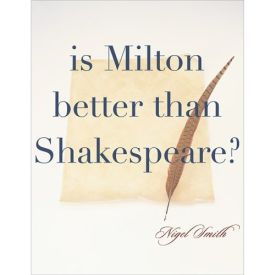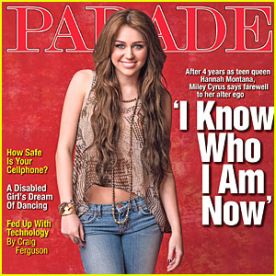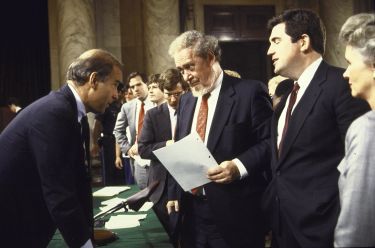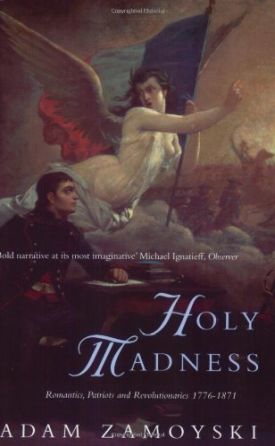Milton: Better than Shakespeare?
From The Washington TimesIs Milton Better than Shakespeare?
By Nigel Smith
Harvard University Press, 214 pp., $22.95
The title of Nigel Smith’s book is a con, though the author calls it a “provocation.” Actually, it is a double con. Not only is its question never really answered, but there is next to nothing in the book about Shakespeare, either on his own or in comparison to Milton. The only purpose of the title is to serve as a lure to the curious, who might be tempted to buy the book — perhaps as a kind of provocation of their own. In explanation, Professor Smith, who teaches at Princeton, has only this to say: “I am not suggesting that it makes sense to argue that Milton is better than Shakespeare in any absolute way, but I do maintain that there are certain ways in which Milton is more salient and important than Shakespeare because he is the poet who places liberty at the center of his vision.”
In other words, if you take — as most of the academic audience for whom the book is intended do take — the “progressive” view of history, Milton may not be better than Shakespeare, but he’s a lot more like us. Specifically, he’s a lot more like those of us who are progressives. This is a variation on what Sir Herbert Butterfield called “the Whig interpretation of history” by which the past, instead of being taken on its own terms, is seen in terms of the present. Therefore, the people and events and documents of the past that look like precursors of our splendid selves are regarded as “more salient and important” than the people and events and documents that merely look strange and old fashioned.
It is perhaps one measure of the extremity to which progressivism has brought us that, as Milton has come to seem (at least to progressives) salient and important, Shakespeare has come to seem strange and old-fashioned. Anyone who has ever been moved by one of Shakespeare’s plays might want to think about that.
Anyway, the answer to the question of the title is, in the absence of any real defense of the contrary, a resounding no. Milton is most certainly not better than Shakespeare. Everybody pretty much knows that already, which is what makes asking the question provocative. But Professor Smith has put it in such a way and in such a context that, within the narrow frame of reference of his book, it could be answered — indeed, must be answered — yes. To him, the terms better and worse indicate not an aesthetic but a political judgment. His view of English literary history is similar to that of Robert Browning in “The Lost Leader,” a slashing attack on Wordsworth for taking a small royal patronage appointment to help make ends meet:
Shakespeare was of us, Milton was for us,
Burns, Shelley were with us, — they watch from their graves
He alone breaks with the van and the freemen;
He alone sinks to the rear and the slaves!
“Us,” of course, means the politically progressive forces in Victorian Britain which Browning saw, romantically, as having been led by the country’s poets — whom one of those “with us,” Shelley, once called “the unacknowledged legislators of the world.” Actually, it was someone who wasn’t “with us” at all, Dr. Samuel Johnson, who said that first, but he meant something a little different by it, I think. Anyway, Browning might have agreed with Professor Smith’s view of the relative merit of these two poets, at least insofar as it remained limited to political correctness — and if we take being “of us,” like Shakespeare, as a bit less progressive, perhaps even a bit uninvolved and non-committal, when compared to Milton’s more gung ho “for us.”
That he really was proleptically “for” later generations of progressives is a problematical proposition, though Professor Smith gives a spirited defense of it. His book is really yet another gloss on William Blake’s famous observation that, in Paradise Lost, Milton was “of the devil’s party without knowing it.” Only Professor Smith seems to think he did know it, at least at some level.
Far from convincing us to look only within our sphere, Raphael’s strictures on knowledge seem as much to spur us on to seeing further into creation, and the narrator dares to make us see Satan’s part in the great rebellion that was anticreation. Whatever Milton did or did not know of science, whatever he thought of its discoveries, whatever he thought of the relationship between the authority of ancient literature and the findings of empirical observation, he propels his readers to approach the knowledge of the gods even as he strides over one and a half millennia of restrictive thinking.
So then is the poet meant to be seen as whispering to us, as Satan does to Eve in Book IX of Paradise Lost, “ye shall be as Gods” by receiving from his hand what Browning calls “the new knowledge”? The professor is too cagy to answer this question directly, but we might detect an implicit affirmative in his insistence on an easy dialogue between Milton’s quirky theology and academically and politically fashionable theory of today.
Here, for instance, is what he has to say about the passage in Book IV (ll. 453-75) of Paradise Lost where Eve describes her first glimpse of her own reflection in a lake:
For some readers these lines are an amazing account of same-sex desire before Eve’s innocent but amorous impulses are regulated, a waywardness that has to be reclaimed by the heterosexuality of the poem’s order, the story of the lesbian’s denial at the very birth of her self-consciousness.
Maybe “readers” is not quite le mot juste here! Likewise, he calls the “gums of glutinous heat” that Comus uses magically to fasten the lady of that poem to her chair “very hot, sticky, and, frankly, spermatic” and therefore “a further indication of Milton’s refusal or inability to confront these issues” — that is, his own sexual desires.
This kind of thing strikes me as a ritual obeisance to academic pseudo-scholarship of the currently fashionable variety which interprets all the “great” works of the past and all the non-great works of the present alike as encoded political messages either affirming or “transgressive” of the established order of exploitative power relationships. But at a more serious level, what Professor Smith is trying to do is to reconcile Milton’s political radicalism with his religious belief — which in so many ways, at least to recent thinking, seems to contradict it. Some of the difficulty of this task, therefore, is owed to the popular atheism of Christopher Hitchens, Richard Dawkins et al. which has persuaded the popular culture and even many among the educated élites which ought to know better that Christianity is a conservative and reactionary force.
In fact, the progressive views of the atheists themselves would be unimaginable without the religion they so unfairly traduce. The history of Western Civilization is not one of a gradual freeing of subject peoples from the “mind-forged manacles” of Christian belief but rather of the dominant culture’s long and ultimately losing rear-guard action against Christ-inspired enthusiasts and rebels to the established order. That Milton was among the triumphant rebels of his own time is beyond question; that he would have been among the triumphant rebels of ours remains, in spite of Professor Smith’s best efforts, a merely speculative proposition.
Discover more from James Bowman
Subscribe to get the latest posts to your email.







